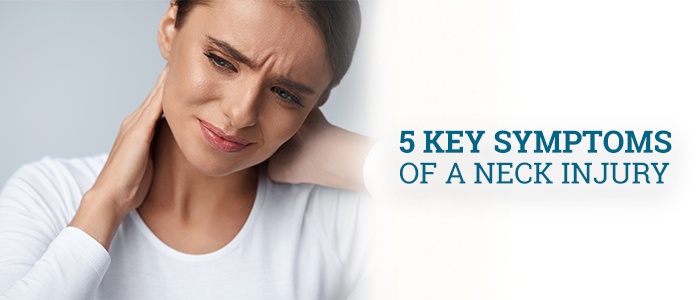
Neck pain is a common problem that about two-thirds of the population experience at some point. After all, your cervical spine and supporting muscles and ligaments support a head that weighs approximately 15 pounds. Due to the flexible but complex structure of your neck, it’s quite vulnerable to injury, both serious and minor. Tracking down the source of neck pain and whether injury is present, though, can be difficult.
To help you out, here are several symptoms that can stem from a neck injury.
General Stiffness
Stiffness is a symptom of many neck injuries. Whether it’s whiplash or a minor strain, your neck may experience some level of stiffness. This symptom alone, though, isn’t reason to worry about neck injury. The remedy could be as simple as icing your neck or doing some stretches. You might also be experiencing symptoms of arthritis.
To help ease neck stiffness, try doing 10-15 reps of these stretches:
- Tilting your head to each shoulder
- Rolling your shoulders backward
- Pressing your shoulder blades together
Want more at-home pain relief ideas? Download our free book: Home Remedies for Back and Neck Pain.
Decreased Range of Motion
Neck injuries can also result in less range of motion - which is often related to general stiffness symptoms above.
If you can’t quite tilt your head all the way in a certain direction—as much as you could before the pain began—you’ve lost range of motion. This can occur after strains and sprains but isn’t cause for alarm if the symptom recedes after a few days. If your range of motion doesn’t return after weeks or you can’t move your head at all, then it’s time to consider a visit to the doctor’s office.
Headaches and Dizziness
When your head is abruptly snapped backward and/or forward with quick force, it can cause what’s known as whiplash. When you experience whiplash, muscles and ligaments stretch beyond their typical ranges of motion. In technical terms, you experience a hyperextension when your neck extends backward beyond its normal limits and hyperflexion when it does so in a forward motion.
Whiplash can result in headaches at the base of the skull, dizziness and blurred vision. Aching and stiffness can also occur. It’s not unusual for symptoms to disappear and then reappear within a few days of the injury.
Sprains and Strains
A sudden jolt to your neck from a hard fall or serious collision, such as a car accident, can result in stretched ligaments and muscles in your neck. Any pain in the back of the neck that worsens with movement or muscle spasms near the upper shoulder can be indicators of a neck sprain or strain, especially if it peaks about a day after the injury occurred. A headache toward the back of the head and decreased range of motion are also signs of a neck sprain or strain.
Tingling and Numbness
One of the more concerning possible symptoms of neck injuries is tingling and numbness in limbs. If you start to feel a numbing sensation or that “pins and needles” feeling in your arms or legs after a neck injury, then it’s best to consult a doctor. Most neck injuries have the potential to produce this symptom but typically only in more severe instances. Usually these symptoms will resolve with non-surgical treatments.
Sources: OrthoInfo, Healthline, Spine Universe


